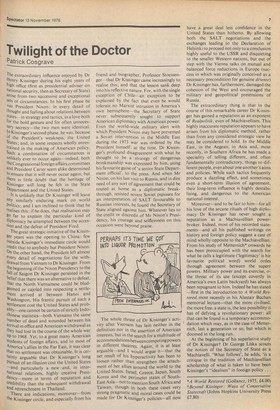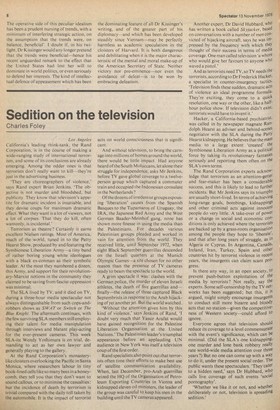Twilight of the Doctor
Patrick Cosgrave
The extraordinary influence enjoyed by Dr Henry Kissinger •during his eight years of high office (first as presidential adviser on national security, then as Secretary of State) arose from two successive and exceptional sets of circumstances. In his first phase he was President Nixon: in every detail of thought and feeling about relations between states—in strategy and tactics, in a love both for the bold gesture and for often unnecessary secrecy—the two men were identical. In Kissinger's second phase, he was, because of the President's weakness, the United States; and, in some respects wholly unrestrained in the making of American policy. Such a combination of circumstances is unlikely ever to occur again—indeed, both the Congressional foreign affairs committees and President Carter seem alike determined to ensure that it will never occur again, but there is little doubt that the heritage of Kissinger will long be felt in the State bepartment and the United States.
It is unlikely that Dr Kissinger will leave any similarly enduring mark on world Politics; and I am inclined to think that he realises this: if he does, that realisation may go far to explain the particular kind of diplomacy he attempted between the accession and the defeat of President Ford.
The great strategic initiative of the Kissinger years was the opening to China: few outside Kissinger's immediate circle would credit that to anybody but President Nixon. On the other hand, the President left almost every detail of negotiations for the withdrawal from Vietnam to Dr Kissinger. From the beginning of the Nixon Presidency to the fall of Saigon Dr Kissinger persisted in the belief that there was an alternative to defeat, that the North Vietnamese could be bludgeoned or cajoled into respecting a settlement arrived at between Hanoi and Washington. His frantic pursuit of such a settlement cost the United States and probablY—one cannot be certain of strictly Indochinese statistics—both Vietnams the same number of dead and wounded between his arrival in office and American withdrawal as they had lost in the course of the whole war op to 1968. Yet, to a great many American students of foreign affairs, and to most of America's allies in the Far East, it was clear that no settlement was obtainable. It is certainly arguable that Dr Kissinger's long Pursuit of an illusion cost the United States —and particularly a new and, in international relations, highly creative Presidency—more in terms of reputation and credibility than the subsequent withdrawal and retrenchment in Thailand.
There are indications, moreover—from the Kissinger circle, and especially from his friend and biographer, Professor Stoessenger--that Dr Kissinger came increasingly to realise this; and that the lesson sank deep into his reflective nature. For, with the single exception of Chile--an exception to be explained by the fact that even he would tolerate no Marxist intrusion in America's own hemisphere—the Secretary of State never subsequently sought to support American diplomacy with American power. Even the world-wide military alert with which President Nixon may have prevented a Soviet intervention in the Middle East during the 1973 war was ordered by the President himself: at the time, Dr Kissinger's profound disagreement with what he thought to be a strategy of dangerous brinkmanship was expressed by him, using his favourite guise of 'a senior State Department official', to the press. And when Mr Nixon, on his last visit to Russia, and in dire need of any sort of agreement that could be touted at home as a diplomatic breakthrough, resisted severe Soviet pressure for an interpretation of SALT favourable to Russian interests, he found the Secretary of State aligned against him. Whatever lies to the credit or discredit of Mr Nixon's Presidency, his courage and selflessness on this occasion were beyond praise.
The whole thrust of Dr Kissinger's activity after Vietnam
has lain neither in the definition nor in the assertion of American interests, but in the search for a multitude of accommodations betweencompet ing powers in different theatres. Again, it is at least arguable—and I would argue it—that the net result of his hyperactivity has been to loosen rather than strengthen the attachment of her allies around the world to the United States. Israel, Greece, Japan, South Korea and the Perimeter states of SouthEast Asia—not to mention South Africa and Taiwan, though in both these cases very strong pragmatic and moral cases could be made for Dr Kissinger's policies—all now
have a great deal less confidence in the United States than hitherto. By allowing both the SALT negotiations and the exchanges leading to the Declaration of Helsinki to proceed not only to a conclusion highly useful to the USSR and disquieting to the smaller Western nations, but out of step with the Vienna talks on mutual and balanced force reductions in Europe (success in which was originally conceived as a necessary precondition for genuine détente) Dr Kissinger has, furthermore, damaged the cohesion of the West and encouraged the military and geopolitical pretensions of Russia.
The extraordinary thing is that in the course of this remarkable career Dr Kissinger has gained a reputation as an exponent of Realpolitik, even of Machiavellism. This highly inaccurate reputation appears to have arisen from his diplomatic method, rather than from any considered strategic view he may be considered to hold. In the Middle East, in the Aegean, in Asia and, most recently, in Southern Africa he has made a speciality of telling different, and often fundamentally contradictory, things to different people, even about one another's aims and policies. While such tactics frequently produce a dazzling effect, and sometimes even a short-term illusion of agreement, their long-term influence is highly destabilising, and dangerous to the American national interest.
Moreover—and to be fair to him—for all his love of the arcane rituals of high diplomacy Dr Kissinger has never sought a reputation as a Machiavellian powerbroker. Indeed, most of his recorded statements—and all his published writings on history and foreign policy suggest a cast of mind wholly opposite to the Machiavellian. From his study of Metternich* onwards he has been preoccupied with the search for what he calls a legitimate (*legitimacy' is hir favourite political word) world ordes through agreement between the superr powers. Military power and its exercise, othe threat of its use (except covertly in America's own Latin backyard) has always been repugnant to him. Indeed he has stated —first in the introduction to A World Restored, most recently in his Alastair Buchan memorial lecture—that the more civilised, the more free, a state is, the less possibility it has of defying a revolutionary power: all that can be found is a temporary accommodation which may, as in the case of Metternich, last a generation or so, but which is doomed in the long run.
At the beginning of his superlative study of Dr Kissingert Dr George Liska scouts the notion of the Secretary of State as a Machiavelli. 'What follows', he adds, 'is a critique in the tradition of Machiavellian scholarship of what is taken to have been Kissinger's "idealism" in foreign policy ... The operative side of this peculiar idealism has been a prudent nursing of trends, with a minimum of interfering strategic action, on the assumption that the trends were, on balance, beneficial'. I doubt if, in his twilight, Dr Kissinger would any longer pretend that the trends were beneficial—hence his recent unguarded remark to the effect that the United States had lost her will to dominate in world politics, or even seriously to defend her interests. The kind of intellectual defence of appeasement which has been the dominating feature of all Dr Kissinger's writing, and of the greater part of his diplomacy—and which has been developed steadily since Vietnam—may be perfectly harmless as academic speculation in the cloisters of Harvard. It is both dangerous and debilitating when it is the major characteristic of the mental and moral make-up of the American Secretary of State. Neither victory nor pre-eminence—nor even the avoidance of defeat—is to be won by embracing defeatism.



































 Previous page
Previous page